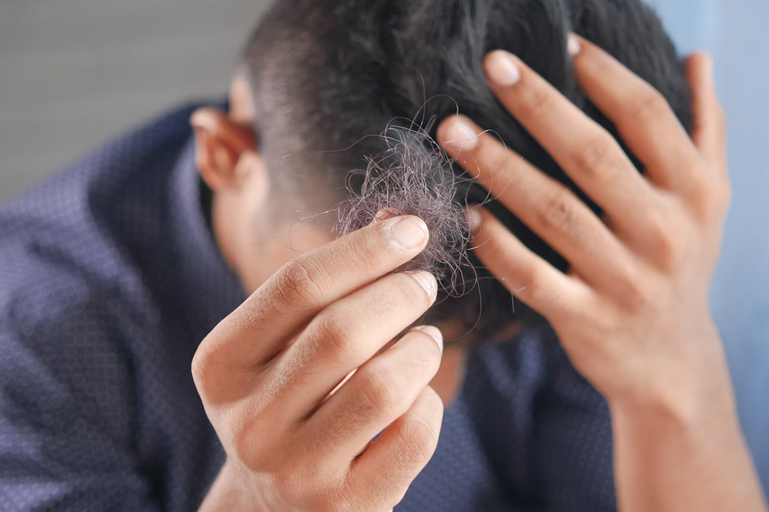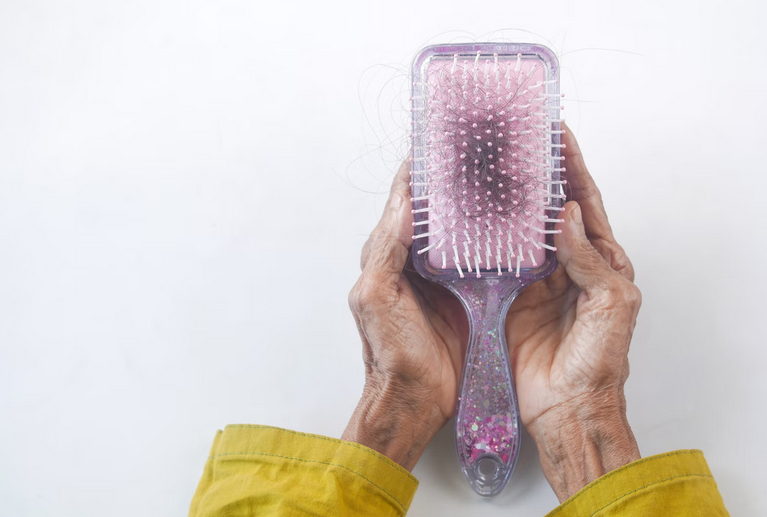Are you noticing more hair in your brush or drain than usual? You’re not alone. Hair loss is a common issue that affects millions of people worldwide, and a variety of health problems can cause it. In this blog post, we’ll explore how conditions like stress, thyroid disorders, and nutrient deficiencies can all contribute to hair loss – and what you can do about it. So please sit back, relax, and let’s get to the root of the problem.
Hormonal Imbalances
Hormonal imbalances can disrupt the natural hair growth cycle and contribute to hair loss. Conditions such as thyroid disorders, polycystic ovary syndrome (PCOS), and hormonal fluctuations during pregnancy or menopause can affect hormone levels, leading to hair thinning or shedding. Imbalances in hormones such as estrogen, testosterone, and thyroid hormones can disrupt the hair follicle’s growth phase, resulting in decreased hair density and quality.
Nutritional Deficiencies
Nutritional deficiencies can profoundly impact hair health and growth. Inadequate intake of essential nutrients such as vitamins, minerals, and proteins can weaken the hair shaft, slow hair growth, and increase the risk of hair loss.
Common nutritional deficiencies associated with hair loss include iron deficiency anemia, vitamin D deficiency, vitamin B12 deficiency, and inadequate protein intake. Ensuring a balanced diet rich in nutrient-dense foods is essential for maintaining healthy hair. If you need additional support with your nutritional intake, you can order Revifol and many other similar supplements from Amazon.
Stress and Anxiety

Chronic stress and anxiety can damage overall health, including hair health. Stress-related hair loss, known as telogen effluvium, occurs when the body’s stress response disrupts the normal hair growth cycle, leading to excessive shedding. Prolonged periods of stress can push hair follicles into the resting phase prematurely, resulting in increased hair loss. Managing stress through relaxation techniques, regular exercise, and stress-reduction strategies is crucial for mitigating stress-related hair loss.
Autoimmune Conditions
Autoimmune conditions occur when the body’s immune system mistakenly attacks its tissues, including hair follicles. Conditions such as alopecia areata and lupus can lead to localized or widespread hair loss, often in a pattern of circular patches or diffuse thinning. In alopecia areata, the immune system targets hair follicles, causing hair to fall out in small, round patches. Lupus, on the other hand, can cause hair loss as a result of inflammation and scarring of the scalp.
Medical Treatments and Medications
Certain medical treatments and medications can have hair loss as a side effect. Chemotherapy, radiation therapy, and some prescription medications, such as antidepressants, anticoagulants, and cholesterol-lowering drugs, can disrupt the hair growth cycle and lead to temporary or permanent hair loss. It’s essential to discuss potential side effects with your healthcare provider before starting any new medication or undergoing medical treatment to understand the risks and explore alternative options if necessary.
In conclusion, understanding the various health problems that can contribute to hair loss is essential for effectively addressing this condition and promoting hair health. By identifying underlying health issues such as hormonal imbalances, nutritional deficiencies, autoimmune conditions, stress, and medication side effects, individuals can take proactive steps to address these root causes and mitigate hair loss. Consulting with healthcare professionals, adopting a balanced diet, managing stress effectively, and exploring treatment options tailored to specific health concerns can help restore hair health and promote regrowth.



